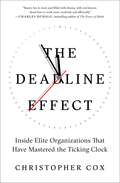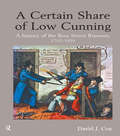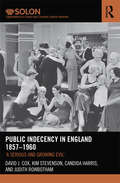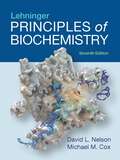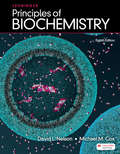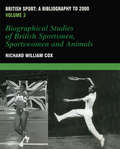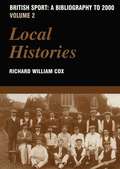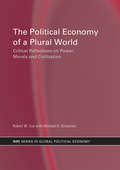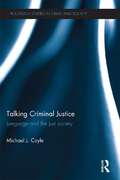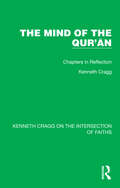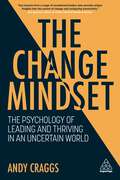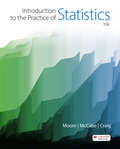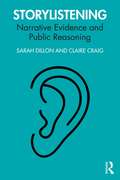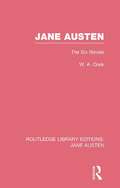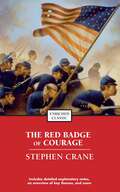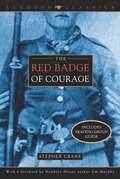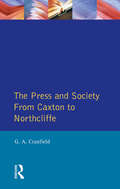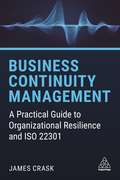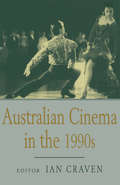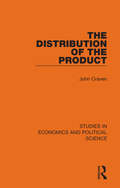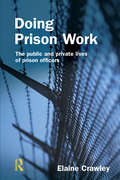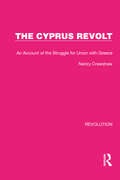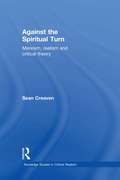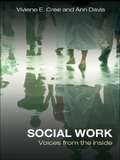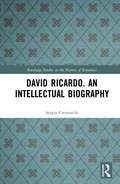Special Collections
Benetech’s Global Certified Accessible Titles
Description: Benetech’s GCA program is the first independent third-party EPUB certification to verify ebook accessibility. By creating content that is born accessible, publishers can meet the needs of all readers. Learn more: https://bornaccessible.benetech.org/
- Table View
- List View
The Deadline Effect
by Christopher CoxIn the tradition of Charles Duhigg&’s The Power of Habit, Christopher Cox&’s The Deadline Effect is a wise and counterintuitive book that explores the power of deadlines as uniquely effective tools of motivation and empowerment.Perfectionists and procrastinators alike agree—it&’s natural to dread a deadline. Whether your goal is to complete a masterpiece or just check off an overwhelming to-do list, the ticking clock signals despair. Christopher Cox knows the panic of the looming deadline all too well—as a magazine editor, he has spent years overseeing writers and journalists who couldn&’t meet a deadline to save their lives. After putting in a few too many late nights in the newsroom, he became determined to learn the secret of managing deadlines. He set off to observe nine different organizations as they approached a high-pressure deadline. Along the way, Cox made an ever greater discovery: these experts didn&’t just meet their big deadlines—they became more focused, productive, and creative in the process. In The Deadline Effect, Cox shares the strategies these teams used to guarantee success while staying on schedule: a restaurant opening for the first time, a ski resort covering an entire mountain in snow, a farm growing enough lilies in time for Easter, and more. Cox explains how readers can understand the psychological underpinnings of expectations and time, the dynamics of teams and customers, and techniques for using deadlines to make better, more assured decisions.
A Certain Share of Low Cunning
by David J. CoxThis book provides an account and analysis of the history of the Bow Street Runners, precursors of today's police force. Through a detailed analysis of a wide range of both qualitative and quantitative research data, this book provides a fresh insight into their history, arguing that the use of Bow Street personnel in provincially instigated cases was much more common than has been assumed by many historians. It also demonstrates that the range of activities carried out by Bow Street personnel whilst employed on such cases was far more complex than can be gleaned from the majority of books and articles concerning early nineteenth-century provincial policing, which often do little more than touch on the role of Bow Street. By describing the various roles and activities of the Bow Street Principal Officers with specific regard to cases originating in the provinces it also places them firmly within the wider contexts of provincial law-enforcement and policing history. The book investigates the types of case in which the 'Runners' were involved, who employed them and why, how they operated, including their interaction with local law-enforcement bodies, and how they were perceived by those who utilized their services. It also discusses the legacy of the Principal Officers with regard to subsequent developments within policing. Bow Street Police Office and its personnel have long been regarded by many historians as little more than a discrete and often inconsequential footnote to the history of policing, leading to a partial and incomplete understanding of their work. This viewpoint is challenged in this book, which argues that in several ways the utilization of Principal Officers in provincially instigated cases paved the way for important subsequent developments in policing, especially with regard to detective practices. It is also the first work to provide a clear distinction between the Principal Officers and their less senior colleagues.
Public Indecency in England 1857-1960
by Judith Rowbotham and Kim Stevenson and David J. Cox and Candida HarrisThroughout the nineteenth century and twentieth century, various attempts were made to define and control problematic behaviour in public by legal and legislative means through the use of a somewhat nebulous concept of ‘indecency’. Remarkably however, public indecency remains a much under-researched aspect of English legal, social and criminal justice history. Covering a period of just over a century, from 1857 (the date of the passing of the first Obscene Publications Act) to 1960 (the date of the famous trial of Penguin Books over their publication of Lady Chatterley’s Lover following the introduction of a new Obscene Publications Act in the previous year), Public Indecency in England investigates the social and cultural obsession with various forms of indecency and how public perceptions of different types of indecent behaviour led to legal definitions of such behaviour in both common law and statute. This truly interdisciplinary book utilises socio-legal, historical and criminological research to discuss the practical response of both the police and the judiciary to those caught engaging in public indecency, as well as to highlight the increasing problems faced by moralists during a period of unprecedented technological developments in the fields of visual and aural mass entertainment. It is written in a lively and approachable style and, as such, is of interest to academics and students engaged in the study of deviance, law, criminology, sociology, criminal justice, socio-legal studies, and history. It will also be of interest to the general reader.
Lehninger Principles of Biochemistry
by David L. Nelson and Michael M. CoxLehninger Principles of Biochemistry is #1 bestseller for the introductory biochemistry course because it brings clarity and coherence to an often unwieldy discipline, offering a thoroughly updated survey of biochemistry's enduring principles, definitive discoveries, and groundbreaking new advances with each edition. This new Seventh Edition maintains the qualities that have distinguished the text since Albert Lehninger's original edition--clear writing, careful explanations of difficult concepts, helpful problem-solving support, and insightful communication of contemporary biochemistry's core ideas, new techniques, and pivotal discoveries. Again, David Nelson and Michael Cox introduce students to an extraordinary amount of exciting new findings without an overwhelming amount of extra discussion or detail.
Principles of Biochemistry
by David L. Nelson and Michael M. CoxLehninger's Principles of Biochemistry earned acclaim for its presentation and organization of complex concepts and connections, anchored in the principles of biochemistry. This legacy continues in the eighth edition with a new framework that highlights the principles and supports student learning.
British Sport - a Bibliography to 2000
by Richard William CoxVolume three of a bibliography documenting all that has been written in the English language on the history of sport and physical education in Britain. It lists all secondary source material including reference works, in a classified order to meet the needs of the sports historian.
British Sport - A Bibliography to 2000
by Richard William CoxVolume two of a bibliography documenting all that has been written in the English language on the history of sport and physical education in Britain. It lists all secondary source material including reference works, in a classified order to meet the needs of the sports historian.
The Political Economy of a Plural World
by Michael G. Schechter and Robert CoxBuilding on his seminal contributions to the field, Robert W. Cox engages with the major themes that have characterized his work over the past three decades, and the main topics which affect the globalized world at the start of the twentieth-century. This new volume by one of the world's leading critical thinkers in international political economy addresses such core issues as global civil society, power and knowledge, the covert world, multilateralism, and civilizations and world order. With an introductory essay by Michael Schechter which addresses current critiques of Coxian theory, the author enters into a stimulating dialogue with critics of his work.Timely, provocative and original, this book is a major contribution to international political economy and is essential reading for all students and academics in the field.
Talking Criminal Justice
by Michael J CoyleThe words we use to talk about justice have an enormous impact on our everyday lives. As the first in-depth, ethnographic study of language, Talking Criminal Justice examines the speech of moral entrepreneurs to illustrate how our justice language encourages social control and punishment. This book highlights how public discourse leaders (from both conservative and liberal sides) guide us toward justice solutions that do not align with our collectively professed value of "equal justice for all" through their language habits. This contextualized study of our justice language demonstrates the concealment of intentions with clever language use which mask justice ideologies that differ greatly from our widely espoused justice values. By the evidence of our own words Talking Criminal Justice shows that we consistently permit and encourage the construction of people in ways which attribute motives that elicit and empower social control and punishment responses, and that make punitive public policy options acceptable.This book will be of interest to academics, students and professionals concerned with social and criminal justice, language, rhetoric and critical criminology.
The Mind of the Qur’ān
by Kenneth CraggOriginally published in 1973, this volume consists of a sequence of essays in religious thinking, responsive to the impact of Quranic style and emphasis. It traces the implications of the Qur’ān in the related fields of man and history, evil and forgiveness, unity and worship, wonder and the hallowing of the world. It does so with a critical eye for the classical commentators, three of whom are translated here in their exegesis of three important Surahs. The underlying emphasis of this book is inter-religious converse and responsibility in the contemporary world.
The Change Mindset
by Andy CraggsChange and uncertainty aren't going away. You can help your team navigate the storm and embrace them.In The Change Mindset, leadership development expert Andy Craggs unpicks the main reasons why teams fail when it comes to dealing with change and navigating uncertainty. He defines the common traps that lead to failure; from not allowing yourself to reimagine the possible, mimicking the behaviour that your competition has shown when dealing with change, to doubting yourself and your team. Leading through change requires business leaders to be courageous and to show empathy, both for themselves and their people. With those attributes, this book, which is steeped in behavioural and organizational psychology analysis, catapults you to developing meaningful and long-lasting adaptability and resilience in the face of uncertainty. Join the author in his exploration of transitions, and hear from world-renowned business, academia, arts and social enterprise leaders who share their own dealings with change. They show us the way in how they have grown to manage change for themselves and the people around them.
Introduction to the Practice of Statistics
by David S. Moore and Bruce A. Craig and George P. McCabeNow available with Macmillan’s new online learning tool Achieve, Introduction to the Practice of Statistics, 10th edition, prepares students for the application of statistics in the real world by using current examples and encouraging exploration into data analysis and interpretation. The text enforces statistical thinking by providing learning objectives and linked exercises to help students master core statistics concepts and think beyond the calculations.
Achieve for Introduction to the Practice of Statistics integrates outcome-based learning objectives and a wealth of examples with assessment in an easy-to-use interface. Students are provided with rich digital resources that solidify conceptual understanding, as well as homework problems with hints, answer-specific feedback, and a fully worked solution.
Storylistening
by Claire Craig and Sarah DillonStorylistening makes the case for the urgent need to take stories seriously in order to improve public reasoning. Dillon and Craig provide a theory and practice for gathering narrative evidence that will complement and strengthen, not distort, other forms of evidence, including that from science. Focusing on the cognitive and the collective, Dillon and Craig show how stories offer alternative points of view, create and cohere collective identities, function as narrative models, and play a crucial role in anticipation. They explore these four functions in areas of public reasoning where decisions are strongly influenced by contentious knowledge and powerful imaginings: climate change, artificial intelligence, the economy, and nuclear weapons and power. Vivid performative readings of stories from The Ballad of Tam-Lin to The Terminator demonstrate the insights that storylistening can bring and the ways it might be practised. The book provokes a reimagining of what a public humanities might look like, and shows how the structures and practices of public reasoning can evolve to better incorporate narrative evidence. Storylistening aims to create the conditions in which the important task of listening to stories is possible, expected, and becomes endemic. Taking the reader through complex ideas from different disciplines in ways that do not require any prior knowledge, this book is an essential read for policymakers, political scientists, students of literary studies, and anyone interested in the public humanities and the value, importance, and operation of narratives.
Jane Austen
by Wendy CraikFirst published in 1965, this reissued work by Wendy Craik provides a thorough and extensive study of Jane Austen's six complete novels: Northanger Abbey, Sense and Sensibility, Pride and Prejudice, Mansfield Park, Emma and Persuasion. This is a truly groundbreaking study of Austen which, in addition to a close analysis of the novels themselves, also goes on investigate the principles by which Jane Austen selected and arranged her material.
The Red Badge of Courage
by Stephen CraneEnriched Classics offer readers accessible editions of great works of literature enhanced by helpful notes and commentary. Each book includes educational tools alongside the text, enabling students and readers alike to gain a deeper and more developed understanding of the writer and their work.The Red Badge of Courage is a powerful tale of the American Civil War. The book has garnered international acclaim for its realism and psychological depth in telling the story of a young soldier and his reaction to the horrors of war. Enriched Classics enhance your engagement by introducing and explaining the historical and cultural significance of the work, the author’s personal history, and what impact this book had on subsequent scholarship. Each book includes discussion questions that help clarify and reinforce major themes and reading recommendations for further research. Read with confidence.
The Red Badge of Courage
by Stephen Crane and Jim MurphyWritten by Stephen Crane at the age of twenty-one, The Red Badge of Courage is one of the greatest war novels of all time -- so groundbreaking that critics consider it to be the first work of modern American fiction. Although Crane never witnessed warfare, The Red Badge of Courage is a realistic and terrifying account of the Civil War and the fear that a young soldier must face on the battlefield as well as within himself.
The Press and Society
by Geoffrey Alan CranfieldFirst published in 1978. Routledge is an imprint of Taylor & Francis, an informa company.
Business Continuity Management
by James CraskImplement practical solutions in business continuity management and organizational resilience guided by international best practice from ISO 22301:2019.Business continuity management and resilience are critical to maintaining a healthy business, but many organizations either do nothing (leaving themselves exposed to disruption), take short cuts (leaving major gaps) or fail to properly engage senior stakeholders. This book is a straightforward guide to delivering an effective business continuity capability, including practical solutions built from the author's personal experience managing hundreds of projects in a variety of business settings.Business Continuity Management compares incident management, crisis response and business continuity and how to explain their importance to senior decision makers to ensure appropriate investment. Readers will benefit from case studies of organizational crises and disruptions, including Home Depot, Nissan, RBS, Facebook, Equifax and KFC, and an exploration of lessons learned from the COVID-19 pandemic. With key performance indicators, templates and checklists covering planning, response, reporting and assurance, this book is the essential reference for business continuity and resilience which can be tailored to any organization.
Australian Cinema in the 1990s
by Ian CravenThis study is a collection of critical and scholarly analyses of the organisation of the Australian Film Industry since 1990. Particular emphasis is put on globalisation, authorship, national narrative and film aesthetics.
The Distribution of the Product
by John CravenOriginally published in 1979, the purpose of this book is to introduce a theory of the distribution of national income between wages, profits and other categories of income. The relation between this branch of distribution theory and other areas of economics is explained in the Introduction. The first six chapters are designed to introduce distribution theory to students of intermediate economic principles. The reader should be familiar with the basic analysis of supply, demand and market equilibrium, and with the use of indifference curves to represent a consumer’s preferences. The remaining seven chapters discuss developments of the theory introduced in the first six.
Doing Prison Work
by Elaine M CrawleyThis book provides a much-needed sociological account of the social world of the English prison officer, making an original contribution to our understanding of the inner life of prisons in general and the working lives of prison officers in particular. As well as revealing how the job of the prison officer - and of the prison itself - is accomplished on a day-to-day basis, the book explores not only what prison officers do but also how they feel about their work. In focusing on how prison officers feel about their work this book makes a number of interesting revelations - about the essentially domestic nature of much of the work they do, about the degree of emotional labour invested in it and about the performance nature of many of the day-to-day interactions between officers and prisoners. Finally, the book follows the prison officer home after work, showing how the prison can spill over into their home lives and family relationships. Based on extensive ethnographic fieldwork in different types of prisons (including interviews with prison officers' wives and children as well as prison officers themselves), this book will be essential reading for all those with an interest in how prisons and organisations more generally operate in practice.
The Cyprus Revolt
by Nancy CrawshawThis book, first published in 1978, examines the local and international aspects of the struggle for Greek union with Cyprus – Enosis. The revolt against the British colonial power was a struggle in which guerrilla warfare, political action and international diplomacy were integrated to bring about union with Greece under the camouflaged objectives of self-determination and anti-colonialism. This book traces the origins of the dispute from the Greek War of Independence of 1821 and then deals in depth with the revolt and its international repercussions up to Independence in 1960 and the Turkish military intervention of 1974.
Against the Spiritual Turn
by Sean CreavenThe argument presented in this book is that the recent ‘spiritual’ trajectory of Roy Bhaskar’s work, upon which he first embarked with the publication of his From East to West, undermines the fundamental achievements of his earlier work. The problem with Bhaskar’s new philosophical system (Transcendental Dialectical Critical Realism or simply Meta-Reality), from the critical-realist Marxist perspective endorsed here, is that it marks both a departure from and a negation of the earlier concerns of Bhaskar to develop a realist philosophy of science and under-labour for an emancipatory materialist socio-historical science. The end-result is a meta-philosophy which is irrealist, speculative, under-theorized, internally self-contradictory, and which cannot provide philosophical guidance to liberatory social practices. In opposition to theist ontological logics more generally (including the rather more rational theism presented by Margaret Archer, Andrew Collier and Doug Porpora), the argument of this book is that the earth-bound materialist dialectics of the classical Marxist tradition, and the naturalistic humanism these dialectics under-labour on the terrain of socio-historical being, offer a much more promising way forward for critical realist theory and for liberatory politics and ethics.
Social Work
by Ann Davis and Viviene E. CreeSocial Work: Voices from the Inside offers unique insight into social work from the perspectives of those ‘on the inside’, that is, service users, carers and practitioners. Drawing on a narrative tradition, fifty-nine people from across the UK tell their stories about how and why social work came into their lives, and what happened next. Key topics are discussed, including: children and family social work criminal justice social work mental health social work residential child care social work with disabled people social work with older people lessons for the future. Focusing on issues for good practice in social work and social work education, this book is essential reading for students and academics of social work and social policy. It will also appeal to social work professionals and those in allied health, education and care areas.
David Ricardo. An Intellectual Biography
by Sergio CremaschiDavid Ricardo has been acclaimed – or vilified – for merits he would never have dreamt of, or sins for which he was entirely innocent. Entrenched mythology labels him as a utilitarian economist, an enemy of the working class, an impractical theorist, a scientist with ‘no philosophy at all’ and the author of a formalist methodological revolution. Exploring a middle ground between theory and biography, this book explores the formative intellectual encounters of a man who came to economic studies via other experiences, thus bridging the gap between the historical Ricardo and the economist’s Ricardo. The chapters undertake a thorough analysis of Ricardo’s writings in their context, asking who was speaking, what audience was being addressed, with what communicative intentions, using what kind of lexicon and communicative conventions, and starting with what shared knowledge. The work opens in presenting the different religious communities with which Ricardo was in touch. It goes on to describe his education in the leading science of the time – geology – before he turned to the study of political economy. Another chapter discusses five ‘philosophers’ – students of logic, ethics and politics – with whom he was in touch. From correspondence, manuscripts and publications, the closing chapters reconstruct, firstly, Ricardo's ideas on scientific method, the limits of the 'abstract science’ and its application, and, secondly, his ideas on ethics and politics and their impact on strategies for improving the condition of the working class. This book sheds new light on Ricardian economics, providing an invaluable service to readers of economic methodology, philosophy of economics, the history of economic thought, political thought and philosophy.
